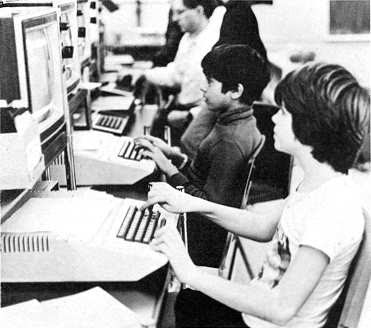Monday, July 9, 2012
TEaCHNOLOGY
The school where I teach is moving towards a one-to-one student to iPad initiative next year with the hope that the unlimited access to information at the tip of your fingers will somehow miraculously boost student performance and the caliber of instruction across the campus.
The verdict is certainly out on the role and impact that technology plays in education. Nonetheless, the incorporation of technology into the classroom is a current that even the most stubborn luddites (like myself) would do better to not resist and, instead, invest their energies towards investigating the questions of HOW, WHY, and WHERE would technology best enhance the learning experience of our students.
To prepare myself for a classroom full of giant cellphones, I've been reading numerous essays and articles on the topic of technology in education. Amidst all the yea- and nay-saying, I found a particular quote from Jake Glasgow, an Instructional Technology Specialist in New York, to be particularly interesting. He writes -
"Obviously - just purchasing technology and putting it into a classroom isn't going to do anything. It's all in how our teachers are using it to facilitate student learning. This is where the problem is." (The21stCenturyTeacher.com)
What was interesting about this statement was Mr. Glasgow's focus on teachers and the role we play in answering the question of HOW we are use technology "to facilitate student learning." At this point, Glasgow provokes a rather interesting paradigm shift in how we generally discuss the role of technology in education.
Rather than asking how technology can improve teaching, I believe that we should focus on how teaching can improve technology.
The "problem" Glasgow points out is huge! We are constantly reminded as educators that we are preparing our students now for jobs tomorrow that don't yet exist. We are told to equip our students for the future with methodologies and systems from a past long gone. As a result, we get a laptop, an iPad, a smartboard, and a library of apps shoved at us and we're told to "pave the way towards a better future." More experienced teachers are suddenly strangers in their own classrooms and new teachers are stranded in a profession where experience is suddenly a matter of trial-by-fire, which could mean life or death depending on the school.
If technology is to be effectively integrated into the classroom experience, it cannot be passed out to teachers like a new toy they need to figure out how to play with. Instead, teachers have to trust and use technology as a professional ally. Beyond the campus email or online gradebook, teachers need an online platform that allows them to stay organized, accountable, connected, and creative as professional educators.
We live in an age of unlimited inter-connectivity. Teachers in America should never feel isolated and alone when they enter their classroom. Best practices and high quality instructional strategies should no longer be confined to individual schools or districts. Teaching as a profession should be and must become America's most creative and progressive enterprise.
Technology makes all this possible. In fact, the technological tools to make this happen are so basic, so simple, it's laughable that we are still twiddling our thumbs and staring dumbfounded at this problem of how technology can improve education.
Teachers improve education. Teachers facilitate student learning. At the FourTeachers Project, we believe technology has to support, trust, and endorse the profession of teaching first and then allow teachers to shape and mold it to most effectively fit in education.
Cheers!
Josh
FourTeachers Project
Subscribe to:
Post Comments (Atom)


No comments:
Post a Comment